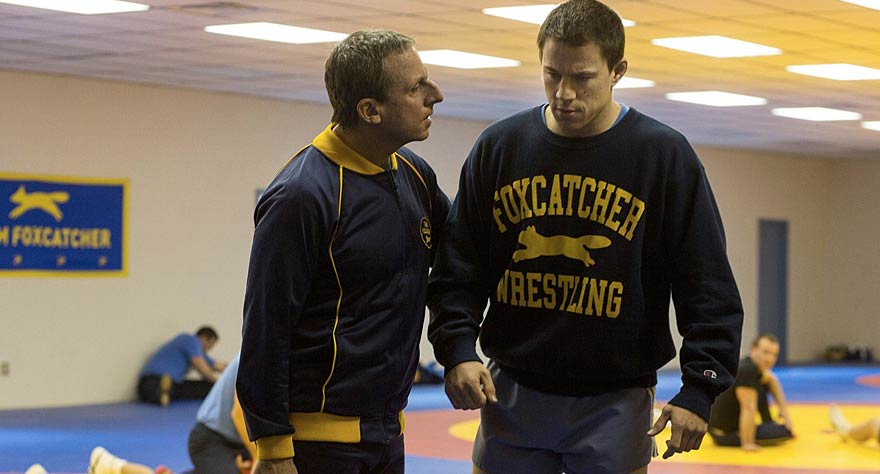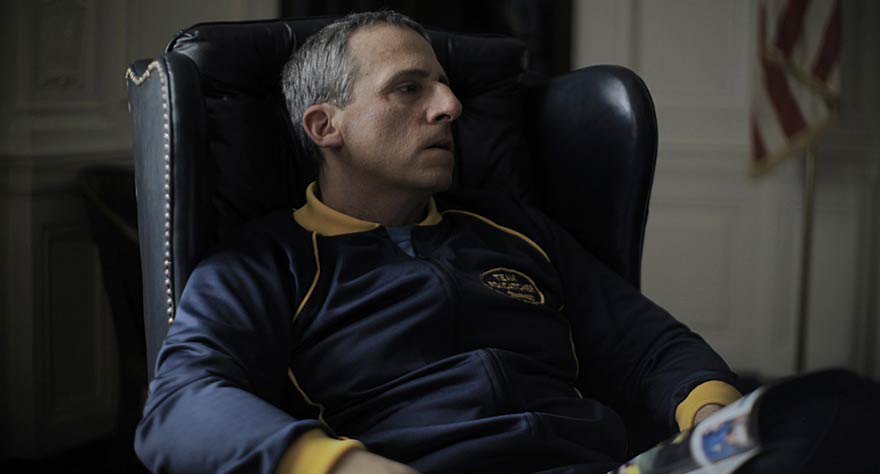
Steve Carell fascinates in the years most psychologically intriguing true crime tale.

Steve Carell fascinates in the years most psychologically intriguing true crime tale.
Director Bennet Miller gets that the complexity of true events and historical people make for the most engaging onscreen experiences. In Moneyball he managed to make the men behind baseball statistics be as compelling as the sport itself. And in Capote he showed that the ongoing relationship of a pair of murderers with the man who wanted to tell their story is every bit as complex and fascinating as the murders they committed. In Foxcatcher Miller melds the strengths of both these films by capturing the intrigue of competitive sportsmanship and the psychological study of one of the most disturbing men to have been in a place of a wealth and power in America. While the film has one of the year’s best performances (by Steve Carell) there isn’t a single person in this bleak but gripping film who doesn’t enthrall with their historical portrayal — shedding light on one of those strange stories that seem too impossible to be true, and showcasing the sort of rare personality that incites fear in all of us.
After having won Olympic gold in wrestling Mark Schultz (Channing Tatum) is at a low point in his career, delivering speeches to restless kids at elementary schools. His elder brother David Schultz (Mark Ruffalo) has also won gold and continues to work as a coach, working with his brother to train for the world championships. Mark seems to have lived in the shadow of his brother’s accomplishments and good nature for much of his career, and having been mostly raised by his brother he is at odds with his desire to impress his father-figure and excel on his own. The spotlight seems to have finally made its way to him when he gets an unexpected phone call from John du Pont, heir to the du Pont fortune (the same family who hands out the prestigious science award) and a self-proclaimed sports-enthusiast and benefactor.
Du Pont flies Mark to his sprawling Pennsylvania estate, Foxcatcher Farms, and presents an irresistible offer: to come train at his facilities and help him build an award-winning wrestling team. From there Mark finds his motivation once again, training for the world championships and recruiting a team of wrestlers, always with encouragement from John to try to get his brother Dave to come be on the team. From their first encounter, John du Pont is painted as an awkward man, secure in his wealth and eccentric in his passion for ornithology (the study of birds) and philately (stamp collecting). His fascination for wrestling seems as much about raw — somewhat erotic — sportsmanship as it is a yearning for team brotherhood and the parent-like relationship of coach and player. Steve Carell’s every interaction on-screen is nail-biting. His prosthetic nose is at first a distraction and then becomes yet another way that Carell and du Pont seem to merge completely. He speaks with a slowness that at first seems to hint at his dim-wittedness but over time makes apparent his calculated way of getting what he wants. He’s the fascinating product of wealth, a single-child upbringing, and hard to please parents. His mental instability is so subtle it’s hard to tell if it’s always there, or if it wavers in and out.

Tatum continues to prove his range, for while he clearly has a believable body for a wrestler, it’s his portrayal of Mark’s immature devotion to whichever father figure is available to latch on to, and his twisted expectations for his own athletic performances (going so far as physical damage to himself), that show he’s capable of capturing a different sort of mental illness than the one du Pont manifests. Mark Ruffalo as David is the only real outlet for positivity in the film, and his representation of David as an ideal older brother and mentor is almost too sweet, causing confusion as to why Mark could be so easily led astray. But his pedestal-standing character only makes the film’s inevitable historic ending that much more heartbreaking.
For anyone who’s managed to avoid reading about the history of the Schultzes and John du Pont, I won’t spoil the story, but I will say that Miller has done an excellent job of focusing less on the scandal and more on the people involved. It’s a therapist’s psychoanalytical nightmare, having so many neuroses on hand. Miller did right in focusing the story on Mark and John, rather than David and John, despite where history inevitably led. With Mark and John he’s able to explore the bond between two men looking to fulfill impossible needs, each hoping their salvation lies in the other. In one of the film’s most fascinating scenes, Mark and John ride in a helicopter together to a benefit dinner and Mark practices his intro speech for John. John snorts cocaine out of a fancy leather pouch and makes Mark repeat the words “ornithologist, philanthropist, and philatelist” over and over until he can say them with confidence, reiterating his own ideology that given enough time and prodding, he can indoctrinate anyone into showing him respect and possibly love. It’s creepy and compelling all at once.
The true crime nature of the film is a draw, but the performances of the film are what solidify it as one of the year’s best, marking Bennett Miller as a nuanced and capable director. His aesthetic and understated work with cinematographer Grieg Fraser allow the characters to tell their own story and set the sort of realistic tone that adds no note of Hollywood sensationalism. Foxcatcher is chilling, sobering, and the sort of film that will cause audience members to question the people they meet on the street. It’s the sort of cold reminder that within us all lies the capability of strange and frightening behavior. A morbid sick reminder that almost no one can help but be drawn to.